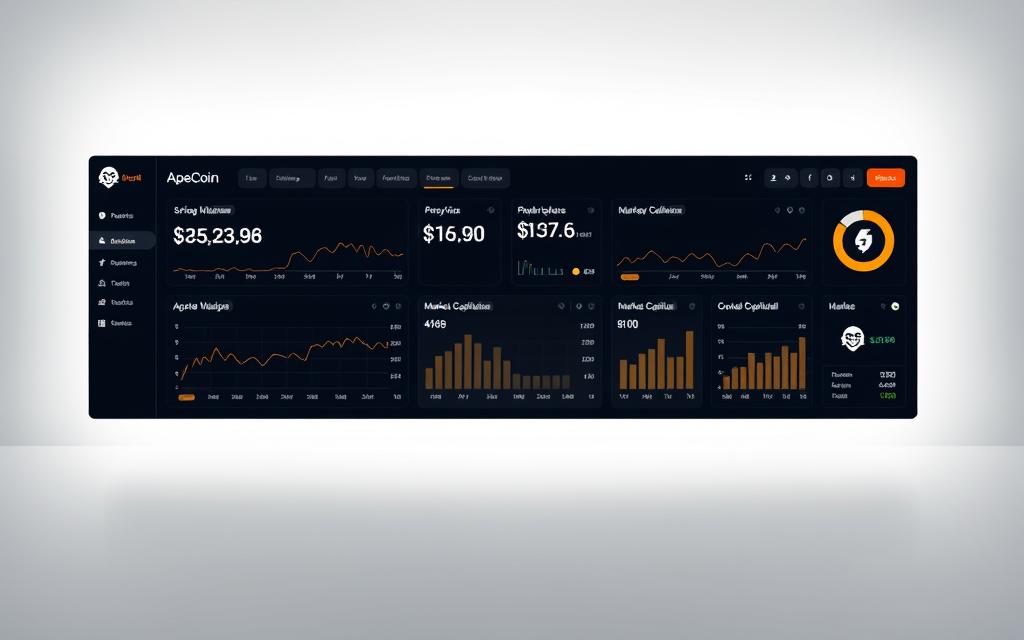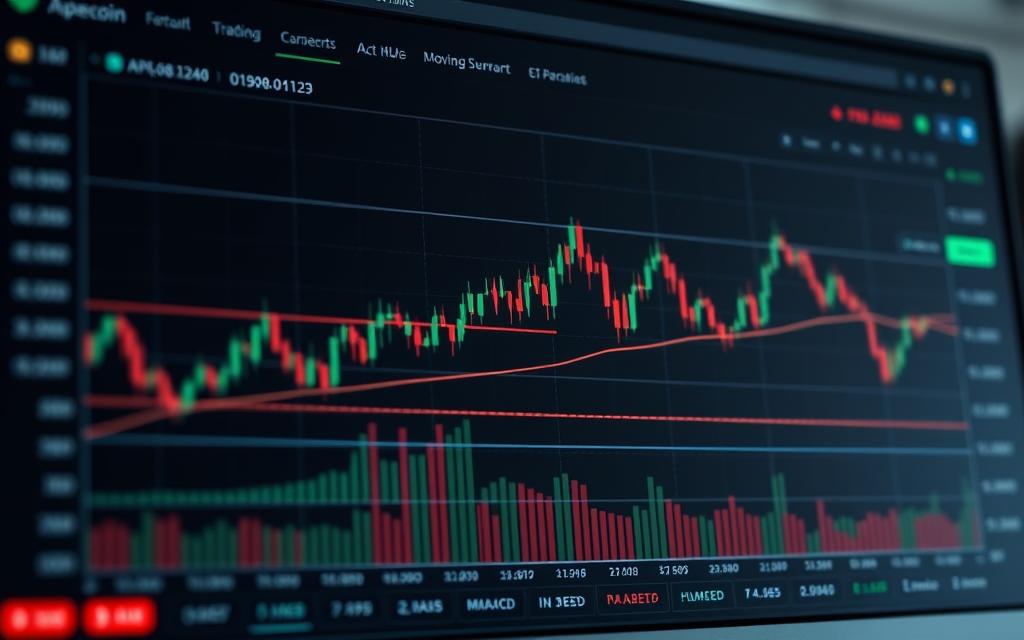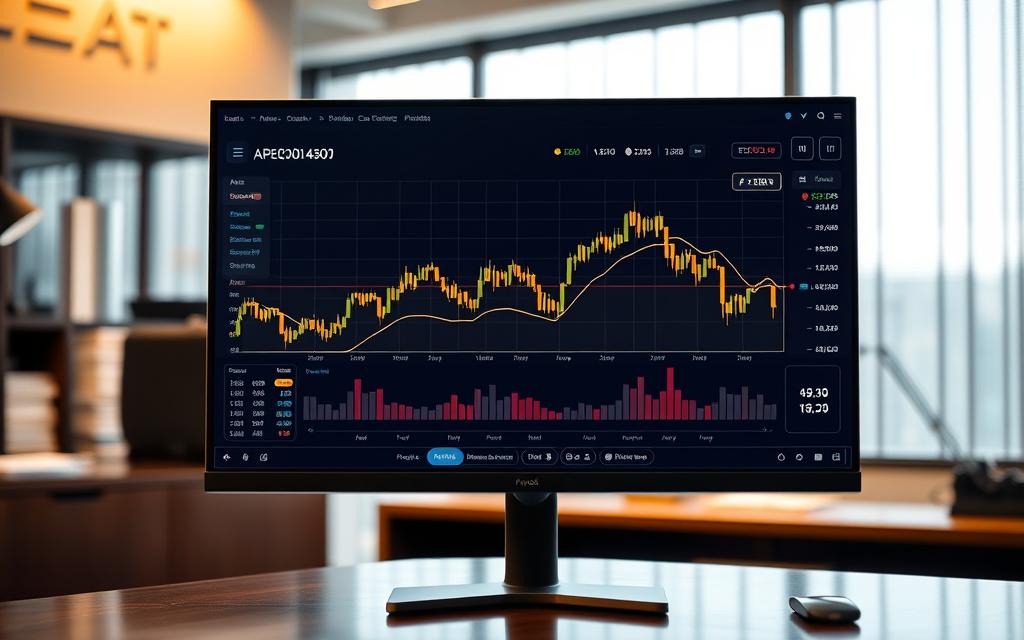Table of Contents
ApeCoin has become a major player in the Web3 and NFT spaces. Its growing ecosystem attracts traders and collectors alike. With a recent 116% surge after ApeChain’s launch, the token now ranks as the 8th most traded on Ethereum.
Market data reveals key insights. Currently priced at $0.699, APE shows a 1.76% daily gain. These figures matter for both short-term traders and long-term investors. Knowing how to analyze them helps make informed decisions.
This guide breaks down essential metrics like supply, market cap, and price trends. Whether you’re new or experienced, understanding these details maximizes opportunities in the fast-moving crypto space.
What Is ApeCoin (APE) and Why Do Metrics Matter?
APE’s dual role as a governance utility token fuels the Bored Ape Yacht Club’s metaverse ambitions. Launched in March 2022, it operates as an ERC-20 token with a fixed supply of 1 billion, of which 752.65 million are in circulation. Metrics like price, supply, and allocation reveal its health and potential.
The ape ecosystem thrives on APE’s utility. It serves as gas for ApeChain and grants voting rights in the ApeCoin DAO. Recent proposals, like replacing the DAO with ‘ApeCo,’ could reshape ApeCoin DAO governance updates, impacting token holder influence.
Tokenomics highlight strategic allocations:
- 62% to ecosystem development
- 16% to Yuga Labs and charity
- 14% to launch contributors
These allocations ensure long-term growth, reflected in APE’s 42.21% monthly surge.
In the Web3 space, APE powers the Otherside metaverse and NFT trades. Its Native Yield mechanism adds stability despite 5.73% volatility. Understanding these metrics helps investors gauge risks and opportunities in this dynamic ecosystem.
How to Read Key Metrics in Ape.pro Crypto
Market metrics reveal crucial insights into ApeCoin’s position. These indicators help investors track performance, liquidity, and long-term viability. Below, we break down the most critical data points.

Market Capitalization: Gauging Value
ApeCoin’s $526.10M market cap reflects its current valuation. Compared to its $691M FDV (fully diluted value), this suggests 24.7% of tokens remain locked. This gap hints at future supply inflation risks.
Circulating vs. Total Supply: Token Availability
With 752.65M APE in circulation (out of 1B max), supply mechanics impact scarcity. Unreleased tokens (247.35M) could influence price stability.
“Token unlocks require careful monitoring to anticipate market shifts.”
24-Hour Trading Volume: Market Activity
Recent $68.72M daily volume signals active trading. The 0.177 volume/market cap ratio indicates moderate liquidity. For context, Binance recorded $7.55M in APE deposits during the same period.
All-Time High and Low: Price Context
APE’s ATH of $27.786 (April 2022) contrasts sharply with its ATL of $0.349 (April 2025). Current price ($0.699) sits 97.5% below its peak but shows an 8.61% weekly gain.
- Technical signals: TradingView’s “buy” rating suggests short-term optimism.
- Annual performance: -47.32% decline highlights volatility risks.
The APE Ecosystem: Where Metrics Come to Life
From DAO votes to metaverse transactions, APE powers a decentralized future. Its utility token design fuels four core pillars: governance, infrastructure, applications, and community growth. Metrics here translate to real-world impact.
ApeChain: Speed Meets Scalability
ApeChain processes transactions in 3 seconds—5x faster than Ethereum. With 5,000 TPS capacity, it supports 214 active projects. Meme-driven activity dominates (63%), but DeFi and gaming integrations are rising.
Wintermute’s market-making ensures 0.35% bid-ask spreads. This liquidity boosts trader confidence in the ape ecosystem.
Governance in Action
The ApeCoin DAO oversees 217 active proposals. Token holders vote on upgrades like ApeChain’s LayerZero integration for cross-chain swaps. Stakers earn 8.2% APY via Decent.xyz’s Native Yield.
“DAO participation grew 40% after ApeChain’s launch, reflecting stronger holder engagement.”
Metaverse and Beyond
APE drives Otherside, hosting 450K monthly users. Virtual land purchases consume 38% of circulating supply. The token also powers economies in 14 games, blending Web3 with entertainment.
- DAO: 62% of tokens fund ecosystem grants.
- Foundation: Manages partnerships like Yuga Labs’ metaverse push.
- DApps: From meme coins to NFT marketplaces.
This ecosystem turns metrics into measurable progress, balancing speculation with tangible utility.
Practical Insights: Trading ApeCoin on Ape.pro
Effective APE trading combines chart analysis with strategic asset management. Whether you’re a day trader or long-term holder, mastering these elements maximizes opportunities.

Interpreting Price Charts and Trends
APE’s 42.21% monthly surge appears as a bullish candlestick pattern. Green candles indicate buying pressure, while red signals corrections. Key levels to track:
- Support: $0.65 (tested twice in May 2024)
- Resistance: $0.72 (previous weekly high)
Binance dominates 38% of APE’s $68.72M daily volume. Compare liquidity across exchanges:
| Exchange | APE/USD Fees | Liquidity Rank |
|---|---|---|
| Binance | 0.10% | 1 |
| Coinbase Pro | 0.15% | 2 |
| Kraken | 0.26% | 3 |
Buying and Storing APE: A Step-by-Step Guide
Trust Wallet simplifies purchases in three steps: fund, select APE, confirm. For security, 87% of large holders use cold storage like Ledger Nano S.
“Hardware wallets reduce hack risks by keeping tokens offline.”
Tax reporting is streamlined with tools like CoinTracker. APE’s 14% long-term capital gains rate applies after 12 months. Arbitrage opportunities exist across 7 trading pairs, including APE/ETH and APE/BTC.
Secure your assets by enabling 2FA on ApeChain’s Web3 wallet. Monitor performance weekly to adjust strategies.
Recent Trends and Future Outlook for ApeCoin
The past year has seen APE transform from a meme coin to a utility powerhouse. Its 116% price surge after ApeChain’s launch reflects growing trust in its ecosystem. Key drivers include staking rewards, metaverse partnerships, and a 47% spike in DAO engagement.

Price Rally and Ecosystem Growth
ApeChain’s 3-second transaction speed fueled APE’s rally. Over time, metrics like daily active wallets (214K) and $68.72M trading volume reinforced bullish sentiment. Yuga Labs’ 2025 roadmap promises 11 expansions, including:
- Phase 1: Otherside land sales (38% supply locked).
- Phase 2: Cross-chain swaps with 14 partners.
- Phase 3: Web3 gaming integrations for 7 titles.
Regulatory and Staking Forecasts
The SEC’s pending security classification (Q1 2025) poses risks. Meanwhile, staking APY could hit 22%, attracting long-term holders. Community-led proposals, like ApeCo’s governance overhaul, may further decentralize control.
| 2025 Projection | Metric | Impact |
|---|---|---|
| Staking Adoption | 22% APY | Reduces circulating supply |
| Meme Economy | $92B market | Boosts APE’s utility in NFTs |
| DAO Participation | 47% growth | Strengthens governance |
“APE’s success hinges on balancing meme culture with real-world utility.”
The community remains APE’s backbone. With 62% of tokens funding grants, its ecosystem prioritizes innovation. As Web3 evolves, APE’s role in gaming and DeFi could redefine its value.
Conclusion: Mastering ApeCoin Metrics for Smarter Decisions
Understanding APE’s ecosystem requires analyzing market cap, volume, and token utility together. These metrics reveal growth potential and risks. TradingView charts and ApeChain explorers help track real-time performance.
APE bridges NFTs and DeFi, offering unique governance benefits. The community drives its value, with 2025 milestones like cross-chain swaps and gaming integrations. Ignoring FDV or supply unlocks can lead to costly mistakes.
Diversify strategies while monitoring metrics weekly. Stay updated on DAO proposals and staking rewards. This approach maximizes opportunities in Web3’s evolving landscape.
Continuous learning ensures smarter decisions in this dynamic space. Keep tools sharp and insights sharper.
FAQ
What is ApeCoin (APE) and its role in the ecosystem?
ApeCoin is an ERC-20 governance and utility token powering the APE ecosystem. It supports decentralized decisions through ApeCoin DAO and enables access to exclusive services, games, and events within the Bored Ape Yacht Club (BAYC) metaverse.
Why is market capitalization important for APE?
Market cap reflects ApeCoin’s total value by multiplying its current price by circulating supply. It helps investors assess the token’s stability, growth potential, and standing against other Web3 assets.
How does circulating supply differ from total supply?
Circulating supply refers to APE tokens actively traded, while total supply includes locked or reserved coins. Tracking these metrics reveals scarcity, inflation risks, and long-term tokenomics.
What does 24-hour trading volume indicate?
High trading volume signals strong market interest and liquidity, making it easier to buy or sell APE without major price swings. Low volume may suggest limited activity or volatility.
How do all-time highs and lows impact APE’s performance?
These metrics show historical price extremes, helping traders identify trends, support levels, and potential breakout opportunities in the crypto market.
Where can I trade ApeCoin securely?
Ape.pro and major exchanges like Binance or Coinbase offer APE trading. Always verify platform security, fees, and supported pairs before transactions.
What utilities does APE offer beyond trading?
Holders use APE for governance votes, virtual land purchases in the metaverse, exclusive NFT drops, and community rewards—bridging crypto with digital experiences.
How do I store APE tokens safely?
Use ERC-20-compatible wallets like MetaMask or Ledger. Enable two-factor authentication and avoid sharing private keys to protect your assets.









